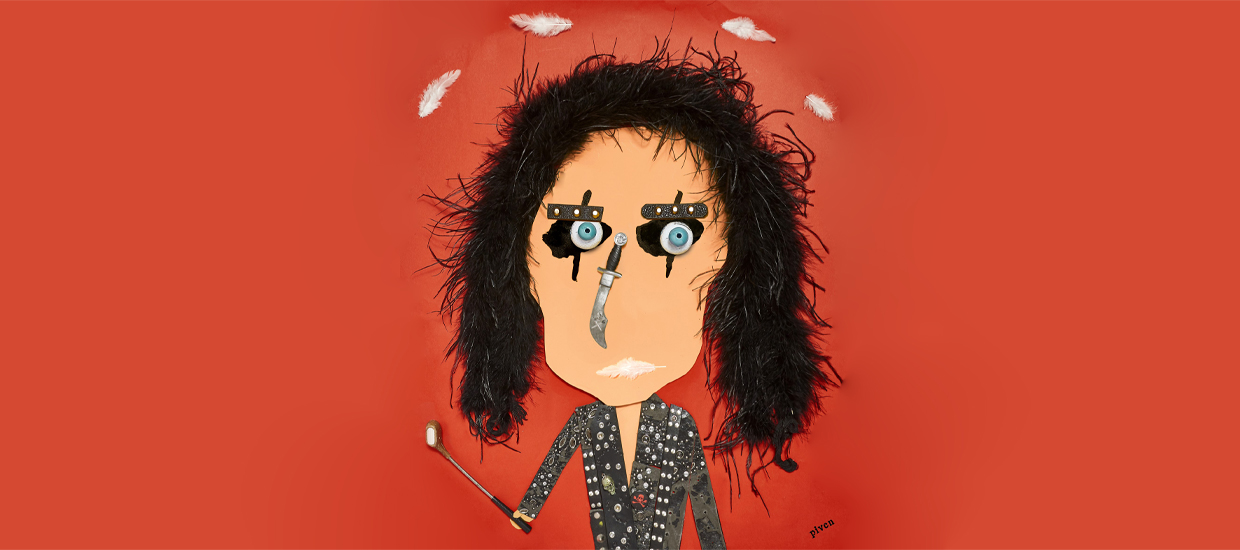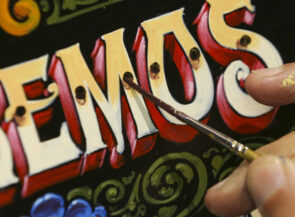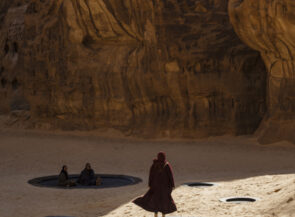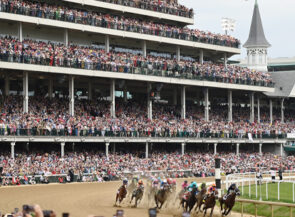The clean-living shock rocker talks to Hemispheres about his 29th album and what it’s like to be ‘Alice Cooper’
To contemplate Alice Cooper is to hold night and day in mind at once. On one hand, there is the Alice Cooper who once (supposedly) ripped the head off a live chicken on stage and (definitely) threw the pearl-clutching establishment into paroxysmal moral panic as he climbed the charts in the 1970s. He is the archetypal shock rocker, a man whose name is so synonymous with theatrical hard rock one hardly need list his hits to establish him as the godfather of the genre (although we’d be remiss if we didn’t call out “I’m Eighteen,” “School’s Out,” and “No More Mr. Nice Guy”). On the other hand, Alice Cooper, when he’s not on stage, is a long-married, very sober, golf-loving, Christ-fearing, septuagenarian grandfather. He seems to have grown into the very image of propriety against which he originally rebelled. None of this is lost on Cooper, who, at 75, is as spry, sharp, and prolific as ever. In the run-up to Road, his 29th studio album, Cooper took some time from another busy tour to talk about the evolution of, well, Alice Cooper.
Hey, Alice. How you doing?
I am doing great. I’m in… where am I? Switzerland.
No pun intended, but you’re a man on the road constantly.
It’s funny, because we just finished the first leg of the American tour for the last album. Then I went right to Europe to work with the Hollywood Vampires [Cooper’s band with Johnny Depp and Aerosmith’s Joe Perry] for two months, and then I went right back out to the Alice tour after this. It’s the tour that never ends.
It feels like you’ve been on the road for 40 years.
Oh, more than that. We started in 1964, and I’ve never stopped.
OK, so you’re in Switzerland right now, you were in Spain last week, and you’re headed to London next. At this point, do you get a taste of the towns, or do you pretty much load in, sound check, play, load out, and move on?
As soon as my wife [Sheryl Goddard] and I get the hotel room, we go out for a walk. We probably walk 10 miles a day, just exploring. It doesn’t matter where we are. Sometimes you have two days off in Budapest, but some days you have two days off in Podunk, Indiana.
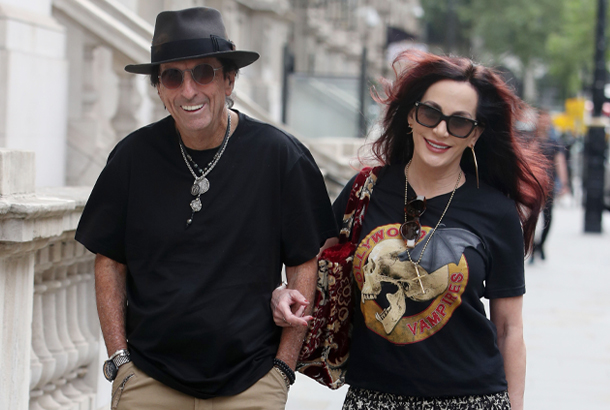
Nothing against Podunk, Indiana. I hear it’s lovely.
I love Podunk, Indiana, very, very much. It’s very much like Budapest [laughs]. But we never sit in the hotel room. Also, I play golf in the morning nearly every day.
If there’s access to a course, right?
In Europe, it’s a little harder. In America, you just find a golf course and go play nine holes. I’ve played every major course in America. My favorite is Muirfield Village in Ohio. For some reason it’s just a beast. Mākena is my home course in Maui. In Arizona, I belong to the Phoenix Country Club, which is more than 120 years old and has more history than any other course around. Ultimately, though, to me, a golf course is a golf course. If it’s in bad shape, well, you still have to get the ball in the hole in four shots.
It keeps you in shape, too.
I’m telling you, I’m 75, I’m doing five shows a week—an hour and a half all out—and I’m the only one not breathing hard.
You and Iggy Pop came up in the Detroit scene and are both miraculously and unexpectedly very healthy and very active.
Most of my friends died at 27. Jim Morrison, Jimi Hendrix, and Janis Joplin—they were my big brothers and sisters. If you could get past 27, nobody expected you to have a career past 30. Forty-five years later, I’m in two touring bands.
Did you ever have that moment of thinking, Maybe I should hang it up?
No, I never did. When I got sober, which was 40 years ago, the thing that would’ve stopped me no longer could. I never touched needles or anything else, but I, like everyone else, was in the great cocaine blizzard of 1978 to 1983. I survived that, but actually drinking was the more destructive thing for me. I could drink all day and never really get drunk. I would just be in a nice golden buzz. It would have been better if I’d had hangovers.
Right. Because you didn’t have an impetus to stop.
Exactly. I felt great all the time. The only problem was, internally, my drinking was starting to kill me. At that point, survival became the number one thing, you know? I went to the hospital and, when I came out, it was a spiritual thing. God just took alcoholism away from me. I came out and people said, “You’re a cured alcoholic.” And I said, “No, I’m a healed alcoholic.”
When did you turn to golf?
Right about then, too. The worst thing that an alcoholic can do is to be sitting at home in front of the TV all day, because you immediately start thinking, Boy, a drink would be good right now. I would get up in the morning, and I would go play 18 holes, and then I would have lunch, and then I’d play 18 more holes. By the end of that year, I was like an eight handicap, and I realized that now I can go back out on the road.
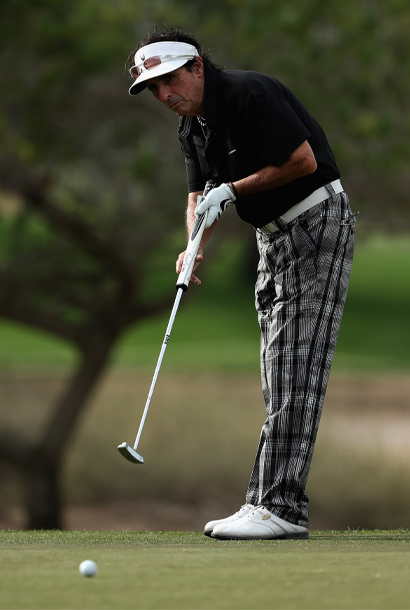
How much of being on the road comes from the same impulse of not wanting to be home in front of a television?
Well, it’s not that. The TV’s on all the time on the road. The TV was not the problem for me [laughs]. I’m a total lifer. I’ve never gotten tired of rock ’n’ roll. Every night it’s hell’s-a-poppin’. First of all, I get to do all my own songs. Second of all, I’m surrounded by the best players and the best road crew in the world. And, thirdly, I get to create this theatrical show around this character that I’ve invented called Alice Cooper. It’s impossible to get bored with that.
What is your relationship with the character of Alice Cooper?
When I started, I was in a bar band, like everyone else. The Beatles were a bar band. The Stones were a bar band. Everybody worked. We were all cover bands. When we got to the point of doing our own songs, I didn’t just want to be the lead singer. I said, “I’m going to create a lead singer that I can play, but he’s going to be my favorite rock star.” I wanted this guy to be thin. I wanted him to look vampiric. I wanted him to look dangerous, sexy, and I didn’t mind him slipping on a banana peel once in a while. I wanted him to be funny and sexy at the same time. In order to do that, I had to create this character piece by piece. And then, finally, I had him, and I went, “OK, he’s going to be fun to play.”
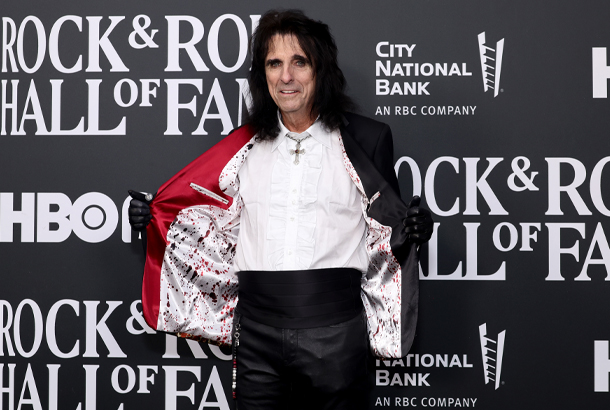
There’s this tension, it seems, between authenticity in music and performance even more now than perhaps when you started. Nowadays, the audience is so clued into the personal biography of who is singing, versus a character like Alice or what David Bowie did in his Ziggy Stardust days.
Honestly, if you met Mick Jagger off stage, he wouldn’t be the same guy that you see up there on stage. You’re always bigger-than-life on stage. But I made Alice extremely unearthly, and that’s what audiences want to see. They want this character to be something that they could never be. That’s what’s fun about playing the villain.
Alice is a heel?
At the end of every show, Alice has to pay for what happens up there on stage: They have to cut his head off, or they have to hang him and this or that, whatever, but he has to die. And then what happens? The very next thing, he comes back, white top hat and tails, to sing “School’s Out,” and Alice is reborn again, right there in front of them. Everybody leaves happy.
How has the character evolved over time? Not you as a performer, but the character of Alice Cooper.
When I first started playing the Alice character, I was drinking, and Alice was sort of the whipping boy, the outcast. He was the victim. When I got sober, I said, “I can’t play that character anymore. I feel great. I feel really healthy. I can’t be that whipping boy anymore. Alice now is going to be this arrogant, over-bearing, condescending villain”—sort of a Vincent Price.
Do you feel as if you’re playing the same character today?
Of course, but the difference is the audience is in on the fact that I’m a Christian. They’re in on the fact that I’ve been married 47 years. They’re in on the fact that I’m a grandfather and a father, that I have a Christian charity—and that has nothing to do with the fact that I play this character. There’s nothing in the show that’s Satanic or that would be sanctioned as something an 8-year-old kid couldn’t see.
What do you think a younger Alice would say about today’s Alice?
That Alice would be in a little bit of awe, because this Alice is so much more positive.
You talk about Alice being overbearing, but on the new album there are a couple of songs that seem exquisitely vulnerable. For example, “Baby Please Don’t Go,” a riff on the Muddy Waters classic, is about a woman begging her lover not to leave as he walks out the door.
Everybody in every band has had that moment when it’s that day when you’re going to go on tour, and you’re going to leave your wife or your lover behind, and you get to the door, and you’ve already said your goodbyes, and she goes, “Baby, please don’t go”—both of them knowing that he has to. That’s the heartbreak right there. Even on the heaviest albums, I always have one ballad that just breaks your heart.
Is that part of showing the audience that this character Alice is a villain, but he’s also a human being? Of course. I have to allow him to be vulnerable for a second, and those are the songs that the women love. When I’m writing these songs, I’ll go home and play them for my wife and two daughters. That moment, when the right line is married to the right minor chord, is magic. I know that every woman is going to see the vulnerability of the character, and they’re going to say, “I can fix him.”
And that spells platinum record right there.
That’s it. I know it’s going to be a hit.
